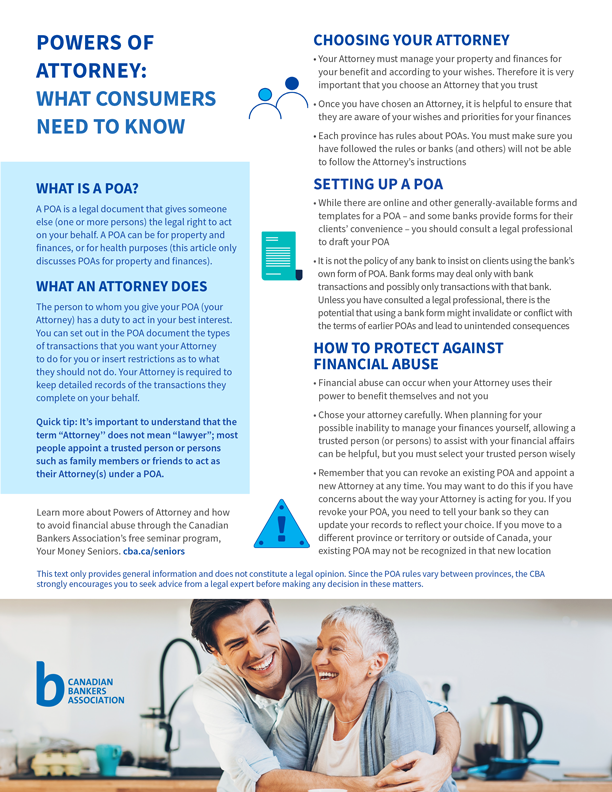Article
What is a Power of Attorney?
A Power of Attorney (POA) is a legal document that gives someone else (one or more persons) the legal right to act on your behalf. It’s important to understand that the term ‘’Attorney’’ does not mean “lawyer”; most people appoint a trusted person or persons such as family members or friends to act as their Attorney(s) under a POA.
A POA can be:
- for property and finances, or for health purposes (this article only discusses POAs for property and finances),
- general (allows the Attorney to act for you in any legal or financial situation) or specific (allows the Attorney to act only for one transaction, e.g. sale of your house),
- limited or unlimited (e.g. limited to day-to-day banking transactions or unlimited for any financial or legal transactions),
- for a defined term or open-ended (may be limited to the time period you are out of the country/in hospital, or going forward indefinitely from the time the POA is signed),
- continuing/enduring or not (continuing/enduring refers to being in effect after you are incapable of handling your own affairs; with a non-continuing/enduring POA, the authority stops when you are no longer capable). In Quebec one must have a separate mandate in case of incapacity to set out instructions for handling affairs following incapacity. See information available from the Quebec government.
Duties of the Attorney
 The person to whom you give your POA (your Attorney) has a duty to act in your best interest. You can set out in the POA document the types of transactions that you want your Attorney to do for you or insert restrictions as to what they should not do. Your Attorney is required to keep detailed records of the transactions they complete on your behalf.
The person to whom you give your POA (your Attorney) has a duty to act in your best interest. You can set out in the POA document the types of transactions that you want your Attorney to do for you or insert restrictions as to what they should not do. Your Attorney is required to keep detailed records of the transactions they complete on your behalf.
You can contact your bank to check the status of your accounts and you can hold the Attorney responsible for failing to manage your affairs as you directed.
Choosing your Attorney
Your Attorney must manage your property and finances for your benefit and according to your wishes. Therefore it is very important that you choose an Attorney that you trust. As a safeguard, you may wish to appoint two attorneys to act together.
Each province has rules about POAs. You must make sure you have followed the rules or banks (and others) will not be able to follow the Attorney’s instructions. If you move to a different province, you may need to revise your POA to meet that province’s rules.
Once you have chosen an Attorney, it is helpful to ensure that they are aware of your wishes and priorities for your finances. Your Attorney should know this before needing to complete transactions on your behalf.
Setting up a POA
While there are online and other generally-available forms and templates for a POA – and some banks provide forms for their clients’ convenience – you should consult a legal professional to draft your POA.
It is not the policy of any bank to insist on clients using the bank’s own form of POA. Bank forms may deal only with bank transactions and possibly only transactions with that bank. Unless you have consulted a legal professional, there is the potential that using a bank form might invalidate or conflict with the terms of earlier POAs and lead to unintended consequences. A valid, general POA will usually meet the bank’s requirements. You can read more about the importance of setting up a valid POA in Powers of Attorney: Bank Requirements.
Revoking a POA
Remember that you can revoke an existing POA and appoint a new Attorney at any time. You may want to do this if you have concerns about the way your Attorney is acting for you, or if your situation changes and you think the person who is currently your Attorney is no longer suitable. Or the current Attorney may no longer be available to act for you. If you revoke your POA, you need to tell your bank so they can update your records to reflect your choice. If you move to a different province or territory or outside of Canada, your existing POA may not be recognized in that new location.
This text only provides general information and does not constitute a legal opinion. Since the POA rules vary between provinces, the CBA strongly encourages you to seek advice from a legal expert before making any decision in these matters.
More Information
The federal government has more information, including a brochure, on its website.
The B.C. government has also prepared supplementary information to complement the federal government’s brochure.